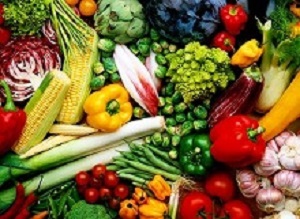 For current and former smokers, eating more fruits and vegetables may lower the risk of developing chronic obstructive pulmonary disease or COPD, a Swedish study suggests, reports Reuters Health.
For current and former smokers, eating more fruits and vegetables may lower the risk of developing chronic obstructive pulmonary disease or COPD, a Swedish study suggests, reports Reuters Health.
Among more than 40,000 men, the current smokers who averaged five or more servings of fruit and vegetables daily were 40% less likely to develop COPD than smokers who ate two servings or less. Each additional serving of fruits and greens was tied to an 8% risk reduction.
“All smokers and former smokers should eat as much fruits and vegetables as possible,” said lead author Joanna Kaluza of the Karolinska Institute in Stockholm. “Each extra serving of fruit and vegetable decreases significantly risk of COPD development,” Kaluza is quoted in the report as saying.
COPD is a category of lung diseases that make breathing difficult and can cause wheezing or coughing. The most common types of COPD are emphysema and chronic bronchitis, and they most often occur in smokers and former smokers. The antioxidants found in produce might help to protect lungs from smoking damage, the researchers found.
The team studied data on 44,335 middle-aged and older Swedish men. None of the men included in the analysis had been diagnosed with COPD at the first assessment. At the start of the study, the participants completed questionnaires detailing how often they ate different types of foods, including fruits and vegetables, as well as their smoking history. Researchers followed the men from 1998 to 2012 and used a patient registry to determine if they were diagnosed with COPD during the study period.
Almost two thirds of the men were current or former smokers and 1,918 were diagnosed with COPD by 2012.
The research team divided participants into five groups according to how many servings of fruit and vegetables they ate daily. The top fifth ate more than five servings per day, while the bottom fifth ate less than two servings daily. After separating them again by smoking status, researchers found a significantly lowered risk of COPD tied to high fruit and vegetable consumption among smokers and former smokers, but not among never-smokers.
Ex-smokers with high consumption of greens were 34% less likely to develop COPD than ex-smokers with low fruit and vegetable consumption, and each additional serving was tied to a 4% drop in COPD risk.
When researchers analysed the types of produce tied to lower COPD risk, they found an association with apples, pears, leafy greens and peppers but not with berries, citrus, tomatoes or onions.
We rely on antioxidants, such as those found in fruits and vegetables, to defend our lungs against harmful substances in cigarette smoke and air pollution, said Seif Shaheen, a professor of respiratory epidemiology at Queen Mary University in London who co-authored an editorial accompanying the study.
However, Shaheen stressed that diet is not a cure-all for the effects of smoking. “The most important thing you can do to reduce your chances of getting COPD is not to smoke/to stop smoking,” he said.
“Eating more fruit and vegetables is likely to be beneficial for your health in many ways, and for smokers who can’t stop smoking this may help to reduce your risk of getting COPD,” added Shaheen, who was not involved in the study.
“High fruit and vegetable consumption not only reduces the risk of chronic lung disease, but also cardiovascular disease, cancers, helps to keep proper body weight and other benefits,” Kaluza noted. “It is possible for everyone to include more fruits and vegetables in their diet,” she said.
Abstract
Background: Antioxidants present in fruits and vegetables may protect the lung from oxidative damage and prevent COPD.
Aims: To determine the association between fruit and vegetable consumption and risk of COPD by smoking status in men.
Methods: The population-based prospective Cohort of Swedish Men included 44 335 men, aged 45–79 years, with no history of COPD at baseline. Fruit and vegetable consumption was assessed with a self-administered questionnaire.
Results: During a mean follow-up of 13.2 years, 1918 incident cases of COPD were ascertained. A strong inverse association between total fruit and vegetable consumption and COPD was observed in smokers but not in never-smokers (p-interaction=0.02). The age-standardised incidence rate per 100 000 person-years in the lowest quintile ( Conclusions: These results indicate that high consumption of fruits and vegetables is associated with reduced COPD incidence in both current and ex-smokers but not in never-smokers.
Authors
Joanna Kaluza, Susanna C Larsson, Nicola Orsini, Anders Linden, Alicja Wolk
[link url="http://www.reuters.com/article/health-copd-produce-consumption-idUSKBN16N2GP"]Reuters Health report[/link]
[link url="http://thorax.bmj.com/content/early/2017/01/03/thoraxjnl-2015-207851"]Thorax abstract[/link]
[link url="http://thorax.bmj.com/content/early/2017/01/27/thoraxjnl-2016-209608?rss=1"]Thorax editorial[/link]
